
COMPUTING
Scope & Guideline
Shaping the Future of Numerical Analysis and Computing
Introduction
Aims and Scopes
- Cloud Computing and Virtualization:
Research in this area explores the optimization of cloud resources, virtual machine migration, and multi-tenancy challenges, focusing on enhancing efficiency and performance through various algorithms and frameworks. - Machine Learning and Artificial Intelligence:
The journal emphasizes the application of machine learning techniques in diverse fields such as healthcare, IoT, and cybersecurity, aiming to improve predictive capabilities and decision-making processes. - Internet of Things (IoT) and Edge Computing:
Papers often discuss the integration of IoT with edge computing paradigms, focusing on resource management, data processing, and the development of smart environments. - Blockchain Technology and Security:
The journal publishes research on blockchain applications, including smart contracts and security mechanisms, addressing challenges in transparency, privacy, and efficiency. - Optimization Algorithms and Techniques:
A significant portion of the research involves developing and refining optimization algorithms for various computing environments, including task scheduling, resource allocation, and energy management. - Network Function Virtualization (NFV) and Software-Defined Networking (SDN):
This area covers the design and implementation of flexible network architectures and protocols, focusing on improving performance and scalability in dynamic environments. - Data Management and Analysis:
Research in this scope includes methodologies for managing and analyzing large datasets, with a focus on machine learning, data mining, and knowledge discovery. - Smart Cities and Urban Computing:
The journal addresses the challenges of urban environments through computing technologies, focusing on traffic management, energy efficiency, and citizen engagement.
Trending and Emerging
- Federated Learning and Privacy-Preserving Techniques:
There is a noticeable increase in research focusing on federated learning, emphasizing privacy preservation in data sharing and analysis, particularly in sensitive domains like healthcare. - AI and Sustainability:
Emerging studies explore the intersection of artificial intelligence and sustainability, addressing how computing technologies can contribute to environmental conservation and resource efficiency. - Smart Healthcare Solutions:
Research related to smart healthcare, particularly leveraging IoT and machine learning for disease prediction and management, is on the rise, reflecting the demand for innovative healthcare solutions. - Enhanced Data Analytics for Decision Support:
The trend towards advanced data analytics techniques that support decision-making processes in various sectors, including finance, logistics, and urban planning, is becoming more prominent. - Dynamic Resource Management in Cloud and Edge Computing:
Papers increasingly focus on dynamic resource management strategies that adapt to real-time demands in cloud and edge environments, highlighting the need for flexible and responsive computing solutions. - Cybersecurity Innovations:
With the growing prevalence of cyber threats, there is a strong emphasis on innovative cybersecurity measures, including machine learning-based detection systems and blockchain applications.
Declining or Waning
- Traditional Software Engineering Practices:
Topics related to traditional software engineering methodologies have seen a decrease in publication frequency, possibly due to the rise of agile and DevOps practices that prioritize flexibility and rapid iteration. - Static Security Models:
Research focused on static security models for software applications has diminished, as there is a growing recognition of the need for adaptive and dynamic security measures in response to evolving threats. - Legacy Systems Integration:
The integration of legacy systems into modern computing environments is less frequently addressed, suggesting a shift toward developing new solutions rather than adapting older technologies. - Generalized Theoretical Computer Science:
Theoretical explorations without direct application or relevance to current technological challenges are less prevalent, indicating a trend towards more applied research that addresses real-world problems.
Similar Journals

Future Generation Computer Systems-The International Journal of eScience
Pioneering Research for a Digital FutureFuture Generation Computer Systems - The International Journal of eScience, published by ELSEVIER, stands at the forefront of the fields of computer networks, hardware architecture, and software engineering, as evidenced by its impressive Q1 quartile rankings in 2023 across these categories. With an ISSN of 0167-739X and an E-ISSN of 1872-7115, this esteemed journal has been a significant contributor to the body of knowledge in the computer science domain since its inception in 1984, continuing to shape the landscape of eScience through cutting-edge research and innovative practices. Featuring a broad scope that embraces various interrelated disciplines, Future Generation Computer Systems is particularly recognized for its high impact factor and prestigious Scopus rankings, where it ranks in the top echelons—8th in Computer Networks and Communications, 5th in Hardware and Architecture, and 17th in Software—placing it in the 95th to 98th percentiles of their respective fields. Although currently not open access, the journal provides invaluable insights and advancements aimed at researchers, professionals, and students alike, driving the evolution of technology and its applications in an increasingly digital world.

International Journal on Information Technologies and Security
Fostering Collaboration in Cyber ResearchInternational Journal on Information Technologies and Security, published by UNION SCIENTISTS BULGARIA, is a pivotal interdisciplinary journal that explores the rapidly evolving fields of information technology and security. With a robust ISSN of 1313-8251, this journal serves as a platform for researchers, professionals, and students to disseminate their findings and innovations in cybersecurity, data protection, and IT system integrity. The journal's commitment to open access enhances accessibility, ensuring that pivotal research reaches a broader audience, encouraging collaboration and advancement in these critical areas. As an invaluable resource for those engaged in the study and application of information security measures, the International Journal on Information Technologies and Security plays an essential role in shaping the discourse and driving forward the knowledge necessary to tackle today’s technological challenges.

Scalable Computing-Practice and Experience
Advancing the Frontiers of Scalable ComputingScalable Computing - Practice and Experience, published by UNIV VEST TIMISOARA, stands as a significant platform for research and discourse in the realm of computer science, particularly focusing on practical applications and scalability in computing systems. Established in 2005, it aims to bridge the gap between theoretical advancements and real-world implementations, catering to a diverse readership that includes researchers, professionals, and students who are keen on exploring innovative computing practices. With an H-index reflective of its contribution and a Category Quartile of Q3 in Computer Science (miscellaneous), the journal offers a rich repository of knowledge, albeit currently not open access, from its base in Timisoara, Romania. The journal is included in Scopus rankings, underscoring its relevancy with a current rank of #144 out of 232 in the General Computer Science category, placing it in the 38th percentile. It invites contributions that expand the horizons of scalable computing methodologies and experiences, making it a vital resource for those engaged in this rapidly evolving field.
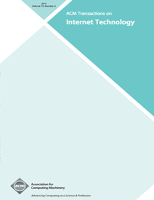
ACM Transactions on Internet Technology
Elevating Research Standards in Internet TechnologyACM Transactions on Internet Technology, ISSN 1533-5399 (E-ISSN 1557-6051), is a premier journal published by the Association for Computing Machinery (ACM) that has made significant contributions to the field of computer science, particularly in the areas of computer networks and communications. Established in 2001, this journal has swiftly ascended to a prestigious Q1 ranking in its category as of 2023, demonstrating its influence within the scientific community, evidenced by its high Scopus rank of #41 out of 395 journals and a remarkable 89th percentile ranking. The journal serves as a vital platform for researchers, professionals, and students, offering a spectrum of scholarly articles that explore advancements in Internet technology, design, applications, and performance. With a commitment to high-quality research, ACM Transactions on Internet Technology is dedicated to fostering knowledge exchange and innovative problem-solving in an ever-evolving technological landscape. Readers can look forward to insights into both theoretical frameworks and practical implementations, making it an essential resource for cutting-edge research and developments in the digital frontier.
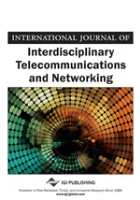
International Journal of Interdisciplinary Telecommunications and Networking
Fostering Collaboration Across Technological FrontiersThe International Journal of Interdisciplinary Telecommunications and Networking, published by IGI Global, serves as a pivotal resource for researchers, professionals, and students in the fields of telecommunications and networking. With an ISSN of 1941-8663 and an E-ISSN of 1941-8671, this journal aims to bridge the gap between various disciplines, presenting cutting-edge research and innovative solutions that address contemporary challenges in these rapidly evolving fields. Although currently not indexed for Open Access, the journal seeks to foster an inclusive platform for interdisciplinary dialogue, encouraging contributions that explore the intersections of technology, policy, and practice. As a dynamic publication, it aspires to enhance the understanding of telecommunication systems and their impact on society, making it an essential addition to the library of any scholar or practitioner looking to stay at the forefront of technological advancements.

International Journal of Advanced Computer Science and Applications
Unlocking New Horizons in Computer Science Applications.International Journal of Advanced Computer Science and Applications, published by SCIENCE & INFORMATION SAI ORGANIZATION LTD, stands as a significant platform in the ever-evolving field of computer science. With its ISSN 2158-107X and E-ISSN 2156-5570, the journal aims to disseminate high-quality research and innovations from diverse areas within computer science, embracing cutting-edge technologies and methodologies. As of 2023, it holds a commendable Q3 ranking in the field, placing it among a competitive cohort of journals while showcasing its commitment to scholarly excellence. The journal operates under an open access model, ensuring that its content is widely accessible to researchers, professionals, and students alike, thereby fostering a collaborative environment for knowledge-sharing and advancing the discipline. With a history of converged contributions from 2017 to 2024, the International Journal of Advanced Computer Science and Applications serves as a vital resource for those seeking to stay at the forefront of computer science research and applications.
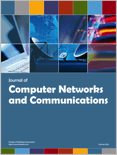
Journal of Computer Networks and Communications
Elevating Standards in Networking ResearchThe Journal of Computer Networks and Communications is a premier open-access journal published by HINDAWI LTD, dedicated to advancing the field of computer networks and communications. With an ISSN of 2090-7141 and an E-ISSN of 2090-715X, this journal has been accessible to researchers since its inception in 2011, promoting widespread dissemination of knowledge in this rapidly evolving discipline. Based in Egypt, the journal's editorial standards are upheld through a rigorous peer-review process, contributing to its strong academic reputation. As of 2023, it holds a commendable Q2 ranking in Computer Networks and Communications and a Q3 ranking in Information Systems within its category quartiles. According to Scopus rankings, it occupies the 141st and 143rd positions in its respective fields, showcasing its relevance and influence in the academic community. The journal's mission is to publish high-quality research that addresses contemporary challenges in networking technologies and systems, making it an essential resource for researchers, professionals, and students seeking to innovate and excel in these fields.

Journal of Internet Technology
Pioneering Research for a Digital FutureThe Journal of Internet Technology (ISSN: 1607-9264, E-ISSN: 2079-4029) is a leading academic publication, fostered by the LIBRARY & INFORMATION CENTER at National Dong Hwa University, Taiwan. Established in 2004, the journal has become an essential resource for researchers, professionals, and students in the fields of Computer Networks and Communications and Software Development, achieving a commendable Q3 ranking in both categories as of 2023. With an impressive track record extending to 2024, the journal offers a platform for disseminating high-quality research and innovative ideas. Notably, it ranks #212 out of 395 in Computer Networks and Communications and #251 out of 407 in Software as per Scopus metrics. The journal remains committed to advancing knowledge and fostering interdisciplinary collaboration in the rapidly evolving digital landscape, making it a vital tool for those looking to stay at the forefront of internet technology research.
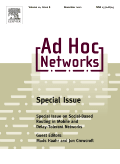
Ad Hoc Networks
Transforming Communication through Cutting-Edge ResearchAd Hoc Networks, published by Elsevier, is a leading journal in the fields of Computer Networks and Communications, Hardware and Architecture, and Software, with an impressive Q1 ranking in all three categories as of 2023. With an ISSN of 1570-8705 and an E-ISSN of 1570-8713, this journal offers a robust platform for disseminating cutting-edge research and advancements in network technologies, emphasizing the importance of efficient communication protocols and architectures in contemporary computing environments. Operating from the Netherlands, it has emerged as a pivotal resource for researchers and professionals seeking to explore novel methodologies, frameworks, and applications within the domain of ad hoc and wireless networks. The journal's high impact factor and Scopus rankings—44th in Computer Networks and Communications, 20th in Hardware and Architecture, and 53rd in Software—underscore its relevance and authority in the academic community. Ad Hoc Networks is committed to fostering a deeper understanding of the complexities and innovations in network design, making it an essential read for anyone invested in the future of communication technology.
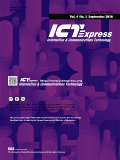
ICT Express
Bridging Theory and Practical Applications in ICTICT Express is a leading open-access journal published by Elsevier that has established itself at the forefront of the fields of Artificial Intelligence, Computer Networks and Communications, Hardware and Architecture, Information Systems, and Software. Since its inception in 2015, this South Korea-based journal has provided a vital platform for disseminating innovative research and practical applications across these rapidly evolving domains. With an impressive impact factor and consistently high Scopus rankings—placing it in the top quartiles of its categories—it attracts contributions from both seasoned experts and emerging scholars. Current access options ensure that groundbreaking findings are readily available to a global audience, thus fostering collaboration and advancement in technology and computational sciences. As ICT continues to reshape various industries, the significance of research published in ICT Express is crucial for staying ahead in the digital landscape.